Shaan Patel of Prep Expert, and Steve Mesler of Classroom Champions, joined EmberTribe's very own founders to discuss their journeys as SaaS app entrepreneurs and how they've juggled their passions for helping women with their drive to grow start-ups.

The following interview excerpts from episode three of Founders Forum have been edited for length and clarity. You can download the full transcript here.
In this interview:
Introductions
Josh: We're here for another episode of the Founders Forum, and I'm really excited about our guests today and just to kind of remind anybody who may be turning in for the first time we decided as a company that some of our best resources, the best network are our clients and people kind of in our immediate orbit here at EmberTribe.
And so I'm really excited to have both of our guests on today. This is going to be more of an education-focused flare just in terms of the industry vertical that we're in. But Shaan we’ll kick it off with you. Just tell us a little bit about yourself, your company, and Steven, we'll go over to you.
Shaan: Yeah, sure. Excited to be here. My name is Shaan Patel and I am the founder and CEO of Prep Expert. It's an online education company. We've basically focused on test preparation and we've been around for about 10 years. We've helped over 50,000 students improve their SAT and ACT scores, get into top universities and win over a hundred million dollars in college scholarships. And yeah, I think the highlight of our company was when I took it on Shark Tank in 2016 and did an investment deal with billionaire Mark Cuban. And he's been an amazing investor advocate and partner for the company ever since.
Josh: Fantastic. Thanks for being here with us, Steve, over to you.
Steve: My name's Steve Mesler, I'm the co-founder and CEO of Classroom Champions, which is an international education nonprofit and charity that operates across the US and Canada, as well as a handful of other countries around the globe. We focus on social, emotional learning, so very different than Shaan's business. We focus on kindergarten to eighth grade.
So we focus on giving students the building blocks that they're going to need to work, to understand how to work hard, how to have resilience, how to fight through you know, fight through a lot of the trauma that they're experiencing right now so that when they get ready to work with John's company, they can go off and they can go off and have even more success. We have, you know, had the incredible opportunity, during COVID to be able to support schools in a brand new way, we've been able to partner with the NHL.
We've been able to partner with huge companies like such as Airbnb or, or, you know, the latest partnership that launched last week with NBC. That's gonna see Classroom Champions, athletes, and methodology, and lessons of perseverance and grit and resilience reach over 4 million kids already. It's reached over 4 million kids in the last week and a half we project. That's going to reach about 20 million kids in the coming few months. So yeah, we're excited. And to, it's an interesting time in the ed-tech sphere, to say the least with the transition that's happening across the industry.
How did your past experiences help set you up for your successes now?
Josh: For sure. It's funny, you know, as people are watching or listening, it's easy to glaze over some of these numbers, but both of your companies combined at scale are reaching just millions and millions of people, which is amazing, right? It's just that, like, you can have that point of leverage in this new age to have the impact that you're having. One question I'd love to ask is just, you know, cause a common myth that we'll bust as we're speaking to founders is that maybe people think that they have to have a lifelong career in a certain space in order to then start a business, you know, on their own. Tell us maybe Steve, we'll start with you. Tell us what you did in a past life and maybe how this set you up for what you're doing now.
Steve: My wonderful transition point into that, into that comment there, Josh... my job before classroom champions, in essence, was running for five seconds and sitting for a minute wearing tights with three other dudes in, in a sled with me. I was a bobsledder in case that didn't put it all together for everybody.
So, I mean the background that I was able to take from sport and move into entrepreneurship is, you know, not too different from whether it's an athlete or whether it's military people who have different experiences, different leadership experiences, different leaderships of triumph and failure. And I experienced all of those through attending three Olympic Games for the US and winning an Olympic gold medal in four-man bobsled. So small team, just again, just like that startup mentality and environment that put me in a situation where, you know, much like most founders, you don't really know what you're doing until you start to go.
You can, you know, we, I had a coach, I used to call him Yoda, but a guy named Yanis who was a Latvian bobsled coach. And Yanis was a driving coach. He was a Soviet-era driving coach, and, you know, for a time I was a push athlete, which means I was one of the horses, much bigger and broader two feet taller, one foot lighter when I was an athlete, but you know, Yanis, when I was trying my hand at driving, I remember walking a track with Yanis and it was the first time I was going to go down the bobsled track and tracks are all different. They range between 1200 meters and 600 meters long. They ranged from going 70 miles an hour at the, you know, top speed to 95 miles an hour. And they all have different turns in different things.
It's not like a running track where it's the same everywhere across the world. And we're walking up the track and, you know, Yanis has given me some ideas, but I wanted more information and more detail from him. What do I do here yet? And it's like, where do I turn? Where do I go? And he kind of just smirks at me. He was like, I'll tell you more after you go once, which is a pretty scary idea when you're about to go off the top of a mile of ice and you're going to hit, we were in Austria at the time, you're gonna hit over 80 miles an hour, whether you are going down faster. So you're going to hit 80 miles an hour. And that's kind of what entrepreneurship is.
You can, you can go to school, you can learn, you can have mentors, but really you know, it's really hard for somebody to mentor you until you have a little bit of a dabbling in an experience of what that is, what it's like to, to hold that kind of stress for that long, what it's like to, to have those late nights and those early mornings and, and the uncertainty.
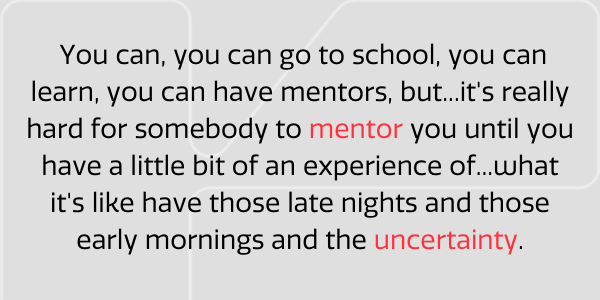
Josh: Fantastic. Well, I'll spare everybody the Cool Runnings jokes maybe until later.
Shaan, let's go over to you. Just tell us a little bit more about kind of your origin story, your background, maybe how it set you up for a Prep Expert.
Shaan: Absolutely. So you know, I, similar to Steve didn't have a solid understanding of entrepreneurship or what I was doing in the beginning. You know, my company was really birthed out of my own experience. The first SAT I ever took barely scored above average. Then I improved my SAT score by about 640 points by self-studying for the exam to a perfect score. Completely changed my life, got into top universities, won half a million dollars in scholarships, got to meet the president of the United States. So it was just like this life-changing thing, this one test for me. And so when I got to college, you know, I wanted to help other students improve their test scores. And so I thought the best way to do that would be to write an SAT prep book. I thought it would be you know, this a best-selling book and everyone would love it.
You know, the first SAT prep book by a perfect score student, it sounded good. But then reality hit, which is when I pitched my book proposal to over a hundred literary agents and publishers and every single one rejected me. They said, you know, the SAT prep market is too competitive. You don't have credentials. You know, I saw every single reason why it wouldn't work. And so that's when I kind of took my destiny into my own hands. I continued to write the book and decided I was just going to use the book as the curriculum for a course. So I taught my very first course, and we had an average SAT score improvement of 376 points over six weeks, which is equivalent to taking a student from the 50th percentile to the 90th percentile. And so you know, after we saw those results, we had parents knocking down the door for more courses.
I began training other instructors and you know, the rest is history, but it went through a lot of rejection, a lot of learning, of getting your hands dirty and learning as you go. As Steve said you know, I had an education with you know, I have an MBA, but you can't really teach entrepreneurship, but I didn't learn much about entrepreneurship with my MBA. I had to learn it from hands-on learning. And so, you know, I think it's really important that people just go out there and try it and not wait for the perfect moment when it, when they approach entrepreneurship and you'll get rejections as all entrepreneurs do and you'll feel failure, but I think the mark of a good entrepreneur is their ability to be resilient to that. And if you have resilience and perseverance and hard work good things can happen for you.
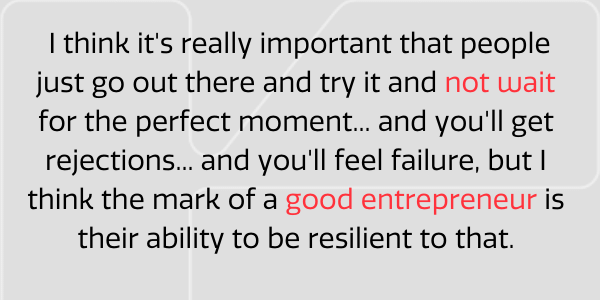
Steve: A couple of things that you said, Shaan, really spoke to me there and I mean, one of them, one of them is one of my other than you guys. One of my other favorite entrepreneurship podcasts is called Masters of Scale with Reed Hoffman, who's the founder of LinkedIn. And like one of the first podcasts I listened to he was... like if you don't look back at your first product with a bit of shame, you waited too long.
Shaan: I look back at my first course with a bit of shame, like the curriculum we were using, the books I was giving, et cetera, you know?
Steve: Yeah, I look back at, you know, my sister and I look back at some of the materials we gave to teachers to support them with the mentorship relationships that we create. And I mean, we had noticed kind of an opportunity and to make a difference when I was still competing and I used to go in and, you know, give a talk at a school like athletes do, or other successful people do.
But again, they didn't know me and I gave a talk and, you know, hopefully, it was good and relevant, but it wasn't, hyper-relevant, wasn't targeted to their needs or their teachers' needs.
We saw an opportunity in education...you have some of the best mathematicians are embedded in the textbooks. You have, some of the best historians are embedded in their ideas are embedded in the way they interpreted embedded in history, same thing in science and English and arts. Where are the Shakespeares of the thing that we hire for as business owners, which is grit and resilience, teamwork, and empathy?
Like, yes, all look for certain skills, but ultimately we're going to hire the people that they need a certain base level of skills, but majority 90% of the jobs we're hiring for, they need these other skills and the school system just doesn't, you don't have resources for those things.
So that's where we decided that you know, and my career was a great thing. I had more to offer than just teaching kids how to push a bobsled, which is by the way, like one of the most worthless skills you could learn in life transition, it transfers into nothing, but the way that I got there and the way that got to the podium and the things I used, or the things that we wanted to teach.
And you know, 10 years ago, there was one state that had legislation or standards around social, emotional learning. SEL is the term education has called now today, there's all 50 States have legislation or standards around these things, which means 10 years ago, there was no place in the school day. Teachers had to sneak this stuff in. It was implicit, right? Like it was implicit that you as a teacher would help kids be better people, but no one ever taught you how to do it.
There was no room in your curriculum or your time to actually do it. So schools have now realized that in the pandemic that there are explicit needs. So Shaan, as you say that, like both of us, it sounds like we believe that our strength is our experience, was our strength, not necessarily our formal education. And then I'm sure you just like me have gone out and gotten experts and made them part of the team and certainly built that. Use, leverage them as a fountain, foundational building blocks. But you know, when you have a thing that can work you know, there's something that'll push you. I think, as an entrepreneur, that's the thing that everybody out there needs to really understand is you've got to believe in yourself and your product to make it work.
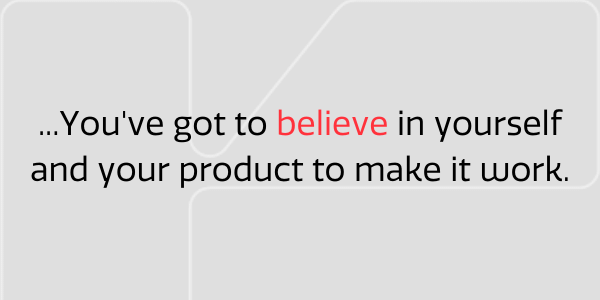
Shaan: Oh yeah, absolutely. And the team helps tremendously. Like, I don't want to sit here and say that I did it all by myself. I have an amazing, amazing team. Just you have to find the right people and that that's half the battle too, is finding the right people who believe in the mission and who have those skills that you just talked about to help you build you know, your company and make in scale it, to be honest.
How do you cultivate grit in your life?
Josh: And so I think both, you will have kind of different perspectives on this or different angles that you approach it. But two-part question, I guess, Shaan, maybe starting with your hundred pitches to literary agents or to publishers. I'm not sure which one it was, but like how do you cultivate grit in your life? But then second part of the question is when do you, when do you give up or pivot or change, like, is it at 101 pitches or was that the magic number? Like, I'd love to hear both of you guys weigh in on that. Like, Hey, how do you cultivate, but B when do you kind of read the room and say, okay, maybe I got to try something different. Yeah.
Shaan: You know, I think to answer your first question, how do you cultivate grit? I think a lot of it comes from, you know, how much self-control you've developed over time. I think, especially in today's world, and I'm sure Steve sees this with kids where people are so used to instant gratification people have lost the patience and their self-control to wait. And a lot of this is patience, especially with entrepreneurship.
I mean, everyone wants to have the million-dollar billion-dollar startup and they want it tomorrow and that's just not how the real world works. And so I think, for me, I've learned over time through school and through studying the SAT, actually spending those hundreds of hours studying for the SAT, taught me a lot about self-control, becoming a physician, which I've also done is taught me a lot about self-control and patience and hard work.
And so that's really how I've cultivated grit. Grit is actually through formal education. Now that's definitely not the only way as Steve has mentioned, he's done it as an athlete and you can do it in all kinds of life experiences. And then in terms of the second question, you know, when do you pivot, I think pivoting, isn't really something that is a one-time thing that you just do. And it's, you know, you're going to pivot this way. There's millions of little pivots that happen in my business probably every day, every year.
And so, you know, you're, you're constantly pivoting trying new ideas. You know, I think I really love the lean startup method, which is trying little things, seeing what works, seeing what doesn't. And I think that's what's helped. Particularly my startup becomes successful is because we're constantly being able to pivot and try new ideas. And I think the same is true for entrepreneurship. You don't have to necessarily make radical paradigm shifts all the time. You know, little tweaks, little pivots can, can really make a huge difference and it's how much you're trying and experimenting and treating it almost like a science project to see what works and what doesn't.
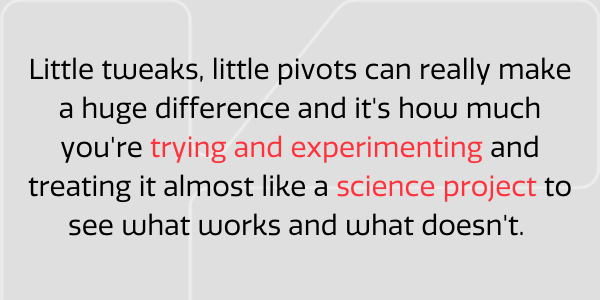
Josh: Brilliant. Steve, I know gold medal. Wasn't just every time you stepped up to the sled, so how'd you cultivate grit? Just tell us a little bit more about kind of your, your path to pivoting or to trying something that didn't work.
Steve: I thought, Shaan, your comments they're spot on. I mean, I think it's, it's so interesting too, to be in a room with people who, you know, who have experienced that and just in totally different ways than I have in myself. And all of those are these other right ways like that. And that's the, you know, in the education system, that is the confusing thing about social-emotional skills or social-emotional development for kids, which is all those other subjects I mentioned there are right and wrong answers.
Generally, you know, alternative facts aside, there are generally right and wrong answers. You know, there is no right and wrong answer of how to cultivate grit or resilience in kids or in adults. So it's become a thorn in the education system side of how you measure these things because if you're investing billions of dollars you know, you want to figure out how your money is going to work.
Just like Shaan, just like your clients really, really objective I'm sure. You know, your score went up or your score went down you know, how much you know, from a cultivating grit as an adult in an entrepreneur role, I think is I'll, I'll say that I was an adult when I was an athlete, but it felt like a different kind of life at that point. You know, I think you've gotta be able to find the joy in the effort and it sounds cheesy and it sounds cliche, but I think that is almost every successful entrepreneur. I was the kid who, when I got in trouble, when I was young, it didn't bother me at all because I got to go to my room. I got my two baskets of Legos out. I spilled them out. I built an entire city when the city was finished, I tore it down.
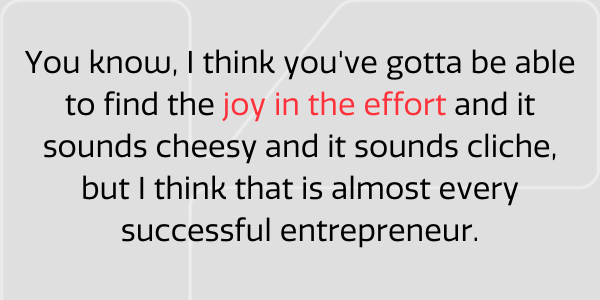
I started over again until I was let out of my room. And I think that was, as I look back, that's what entrepreneurship is like. That is the people who you see continuously flipping companies are building companies is they're building their Lego sets. And the joy is the build. Once the thing's built, they go, okay. And they hand it off to somebody else. And then they move on and once you've done that two or three times, you're not doing it because you need the next sets of millions of dollars for them. They're doing it because they enjoy the process and they enjoy, they, they, you know, they enjoy that. And I think one thing I've really over the pandemic myself have come to realize that, like I not only enjoy the process, I love that. I love the process.
And I look back at my athletic career and I was national champion in high school and then tore my hamstring my senior year. Luckily I'd already sent my letter of intent freshman year, started doing great, hurt myself, sophomore year, junior year, senior, all four years of college, I was hurt and didn't finish my seasons. You know, never really had that moment. And I had this moment sitting on the couch two days out of surgery, like, okay, like clearly this track thing is not, I'm not going to go to the Olympics doing this. I should move on. You know, as an athlete, anybody who did sports in high school or college has had that moment once a day that I'm going to now be done and it's hard and it sucks. I was a little bit too stupid to completely be done.
So I thought, well, what's going on in the back of my head was a coach who had a guy who went to bobsled. So I emailed the Olympic committee back in 2000, which was on Yahoo with one arm. And they got back to me and said, yeah, you're the right size. And the next day I got an email back and I started training from there. But for me, it wasn't just about trying to go find something else. It was okay. I spent four years at a flagship division, one factory for sports and I still couldn't succeed. I have to change the way I do things.
But if you're doing everything that you think is right, that you've been told is right, and it's not working for you, it's not the right thing for you.
So I think that it comes back to your question, which is when do you hit that point? I think you hit that point when you realize that you have exhausted your options doing it the way you thought you should do it. And there are always other ways to find your skillsets, whether it's from track to bobsled, whether it's from bobsled to entrepreneurship, you've got strengths. You got to find those strengths and go after them.
Josh: It's incredibly insightful to hear both of you answer the question because I think in both cases, you know, you had a vision that was very clear, whether it be to make it to the Olympics or to have the best test prep product there is, and your initial paths to going there just were very different, right? It was write a book or it was going to be a track athlete. And then you were very flexible and open to seeing alternate paths to get to the ultimate vision. But then the vision never really changed. And so I think one thing you both hit on is this concept of just iterating and this whole process and discipline iteration.
What are some of the ways that you're learning from your customers? How do you synthesize that feedback to continue a process of iteration?
Josh: So we know that being close to your customers and learning from them is one of the best ways to do that. So I'd love to hear from both of you, what are some of the ways that you get feedback from your, either your prospects or your past clients, whether those be the actual, like end-users in your case, Steve, of students or schools that you serve, or Shaan, the parents of the students or the students themselves, but just, what are some of the ways that you're learning from your customers and how do you synthesize that feedback to continue that process of iteration?
Steve: Happy to, happy to jump in here. I mean, we've always, that's kind of been the bread and butter for us, like coming as athletes. Like, I mean, I moved to a foreign country to work with a coach who told me what I did wrong 50 times a day and then listen to him and then make those adjustments. So it's in our DNA, it's in my DNA to listen to critical feedback.
I mean, everybody's living in scarcity through COVID. So everybody's defenses are higher than they've ever been. So, you know, first and foremost is we create a culture at Classroom Champions that makes it okay to give each other feedback. But then we opened up the floodgates for our teachers. Ultimately they helped us craft our curriculum from day one. The lessons we're teaching, what we're seeing, what we should be looking for. All of that came teacher fed, you know, today, now it's more focused on our technology platform.
The system that we have, we went with a, like a Netflix style. We'd basically cloned Netflix and Disney+ way to serve up the content and the curriculum because we heard from teachers that all of their systems were folder hierarchies and really hard to navigate.
So we wanted to be responsive to them in that way. So for us, it's listening, but it's also then creating empowerment of your users. We have teacher ambassadors, we have opportunities for students. We have opportunities for our athletes to tell us what they think we should be teaching all of our topics and units, goal setting leadership feedback.
Whether it's an Olympian, Paralympian, NCAA, student-athlete, NFL player, NHL player, it has to be things that are authentically easy for them to talk about. And then we give them bumpers and ideas of how to, how to fold that in. So for us, it is again, culture at your company that allows for feedback, then a culture amongst your users that rewards feedback and reward doesn't necessarily have to be giving them something like an Amazon gift card...reward can be, they told you something and then it reflects in the product. That's how we've built it.
Our biggest is our teachers who have been with us for years, see themselves in the products. And when you can see yourself in the product, it is, it's just, as you know, it's Shaan and I are passionate about our own companies. We clearly see ourselves in our products. The more you can let people see themselves in the products, the more ambassadorship and goodwill you're going to build.
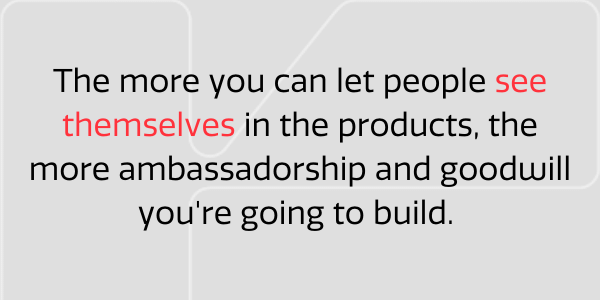
Shaan: I think that's really well said by Steve. I mean creating that culture where it's okay to you know, give and get feedback is really, really important. You know, we do that through both formal ways, such as, you know, surveys, whether it's with our students, parents employees, but also I'd say one of the other ways that we get feedback and use it to iterate is simply looking at the data. So a lot of it will be looking at data and Google analytics or looking at you know, screen captures of how people are navigating our platform and website you know, using that data to make good decisions for iterations to our platform has been really helpful in creating a better user experience.
Josh: Got it. It seems like in both cases, it's just blending together, the quantitative and the qualitative, like making sure that you don't neglect one for the other, and that you're combining a full picture of both and then coming up with an action plan to, to execute on it. That's great. I mean, there's no shortage of tools, right? To collect all this. It's usually the problem isn't collecting the data as much as it is sorting through it and taking action and prioritize and things like,
Can you think back to a time where you started seeing success and what led up to it?
Josh: So in, in most, in most cases, you know, founders with companies of your size and kind of your age you've hit an inflection point at some point. So I'd love for you to think about me. What was it, doesn't have to be the greatest point of scale necessarily, but that inflection point, that place where you either got crazy product-market fit or some point of validation, can you think back to a time where you had that first surge and whatever KPI it might be, but for yo, what led up to it?
Shaan: I think, you know my biggest inflection point at the company, it was when we made the decision to be completely digital. So as I mentioned, you know, 10 years ago, when I taught my first course, it was an in-person classroom. And so that was kind of the model we had for many years. And then we eventually started outing adding online courses and you know, just actually with COVID, we decided to close all of our classrooms. I think it's been a good thing for us. It's helped us scale.
I think that was a big, big inflection point for us because it changed us from kind of a physical in-person company to a complete ed-tech company that's just online.
Steve: For Classroom Champions, I think it's been about 10 years that we've been going. I'd say there's probably three different inflection points. I think number one was...when we got the right chair on board and, and, you know, gave me a mentor again. And then that caused me to out find new mentors as well, and build our board and having him come on as somebody who's, you know, invested. So, look, I don't want to just write a check. I want to get involved when you bring that kind of talent on board, whether it's on your staff or whether it's on your board, it allows you to open the door to all kinds of other people.
So that was a huge inflection point. And think the second one was when we really started to embrace and understand partnerships and how we could leverage our, you know, our status as a nonprofit, our, you know, our UVP or unique selling point of volume of athletes who are volunteering, who are just looking to make a difference.
And then the third one would be when we realized that our product was, you know, it was almost too hands-on as a mentorship. We've been virtual from the beginning because you couldn't travel. We don't have the old gray-haired has-beens like me as mentors.
We have currently competing athletes who are in the moment of their careers, who can show kids that it's not just two and a half weeks of glory on television or the day of the super bowl. There's a process. And I'm not just going to tell you about my process. In fact, I'm going to bring you along on the bus with me on the way to the show for an entire year, multiple years at a time over the mentorship program that involves lifts for the teachers. What we wanted to do was create a little bit more easily accessible, a little bit more digital program. And so we came up with a broader curriculum that is now really helping us. You know, two years ago, we were serving 9,000 kids in our programs and today we're serving 85,000, just in our programs, let alone a reach of over 4 million this year through partnerships.
Josh: Fantastic, something that you both alluded to is obviously that, you know, you're only as good as your team. Like you can't do this alone, whether that be through mentors or through direct hires. So a lot of folks who are watching or listening to this are making me making those first hires, or they've maybe made their first hires and they're either really thrilled or really scared about that decision.
How do you build a strong team for your business?
Josh: What are some things that you can share just about very consciously building your teams, maybe those first key three to five hires what's your thought process there? What type of person do you look for?
Shaan: Yeah. so I think that's always a, it's an interesting time in any company when it scales beyond yourself for the founders, I'd say you know, few tips I have is first, your first couple hires, always try to make them the things that are taking up your time that are low value. You know there's a lot of things I used to do. I used to pick up the phone. I used to do all the customer service emails. And so my first hire was like no brainer, an administrative assistant, right? To help get some of that stuff done. I think you don't necessarily, especially if you're strapped for cash as most startups are, you don't necessarily need to hire a full-time person or a part-time person. Even a lot of this can be done through freelancers and using platforms like Upwork.com.
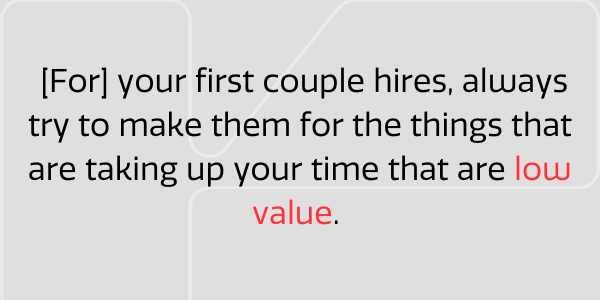
And then the third tip I'd have is in terms of finding good people. Especially when you're making full-time hires is to give them a small project or task as a sample. And that usually gives a very good idea to me, as well as my team, as to whether this person will be able to perform at the level that we expect, and that works for all kinds of positions, but even if it's a content position, ask them to write a blog article or something like that. And that’s usually good because you know, someone could interview really well, but if their work performance isn't there, it doesn't make any sense. So yeah, that's kind of been a good formula for me over the years.
Steve: You know, I don't want to repeat the things that Shaan said. I think those are project-based work. I think that's a lesson that I learned halfway through where, you know, people who, you know, read a lot of people who are really great salespeople out there and they are fantastic at selling themselves. So you've really got to put up some gates that you can test that skillset.
I would say that one thing that we're really, I think we're getting better at Classroom Champions is being open and honest about what it means to work here from a cultural standpoint, from a feedback standpoint.
We're always looking for hundreds, we're always looking for hundreds and, you know, there are times whereas a CEO and a founder, especially, you can add too much value by trying to give too much feedback or trying to give too much upskilling that'll wear your folks down. So that is I think a founder ethic issue that, that we have to deal with, which is, you know, you have to be strategic about where you find those hundreds for your people, so you don't wear them out.
I think the last thing for us has been understanding that sometimes the people that you hire were perfect when you hired them, but they're not perfect for now. And that's probably been the hardest thing for me to come to terms with where I have a coaching mentality, I have a better and better mentality. You know, I founded an organization that is about, you know, better-equipping people, kids in this case, but also teachers to get better, which means that I have a very hard time letting go that I can't help you get better.
Josh: And I just, I think there's a lot of maybe people who are timid about having those conversations, they feel like it's rude, but it's really, you're doing everybody a favor when you're honest with expectations around culture fit because the other person has to work with you or for you on the same team as you you're getting to.
What resources are you tapping into to keep working toward that next level?
Josh: So as we're kind of wrapping up here, you know, I think something that both of you have said is you value continuous improvement and you're a lifelong learner. So outside of maybe the feedback that you're getting from your business, running it in the day-to-day, how are you upskilling? How are you learning? Like where, what sources are you tapping into? Cause again, there's a lot of advice. There's no shortage of advice to listen to. If we podcast be books, it could be other mentors or people, but how do you guys continue to feed yourselves and get to that next level?
Shaan: Yeah, I'd say you know, I think there's probably three places that I really like to learn and get feedback from. So the first is books. So the, you know, a couple of great books that I think are really good for entrepreneurs. So I've mentioned The Lean Startup already, obviously a classic and another lesser-known one, but still very popular is Rework by Jason Fried. The second is podcasts. You know I think podcasts and audio books are great because even if you're as busy as an entrepreneur, as most entrepreneurs are, you can do it on your commute, do it at the gym, whatever.
You know, you're able to get that content in. And then the third one is I, I actually love just attending some webinars with really great digital marketers or entrepreneurs because they usually pack in some great content. And you know, I see millions of ways that new ideas that come to life and applications that could apply to my business by just learning from experts through their webinars. And so I'd say those are the three biggest ways that I continue to learn you know on a weekly basis to, to get ideas from other places and then figure out how to apply them to my business.
Steve: I am on my end, very similar books, leaders you know, books, podcasts, and mentors. My volunteer gig is I sit on the board of directors for the United States Olympic and Paralympic committee, where I have an incredible opportunity to, to sit at a table with amazing people.
Steve: I mean, some books for folks out there kind of John Berardi wrote a book called Change Maker. It is probably the single greatest marketing and leadership book that I've ever read. Another book is What Got You Here Won’t Get You There by executive coach Marshall Goldsmith, amazing as a type-A personality really, really helpful.
Josh: Fantastic advice. I'd get outside the echo chamber and be exposed to different ideas, different fields.
What’s one piece of advice you would give to other founders at an early stage with their company?
Josh: Well, final thoughts. If you could go back to year one of being the trenches of running your business or your organization, what's one piece of advice that you'd give to yourself that you feel may also apply to other people who are early stage with their company just could be as general as you'd like it to be. But if you had that kind of 10 to 15 seconds to speak to, to your younger self, what would you say?
Shaan: I'm going to echo something that Steve said earlier, because I thought it was really good, which is just enjoy the process. I mean, it can be stressful and really hard at times, but it is just so sweet. As you work through the process to get better and you, you can kind of see it in your company growing and the lives you change and the revenue you bring in, et cetera. Like it's, it's an amazing process to be able to grow something from an idea. And I think that's, what's really special about entrepreneurship.
You know, that you're able to take something in your mind and bring it to, you know, material fruition and that's, what's really special. You know, I think if I had the option just to be handed a successful educational company without having to go through the tenure process, I would say no, you know, because I really enjoyed the process and that's what makes it special. So I, I would say that to, to any entrepreneur is that the struggles are what build the character and make the entire journey of entrepreneurship worth it.
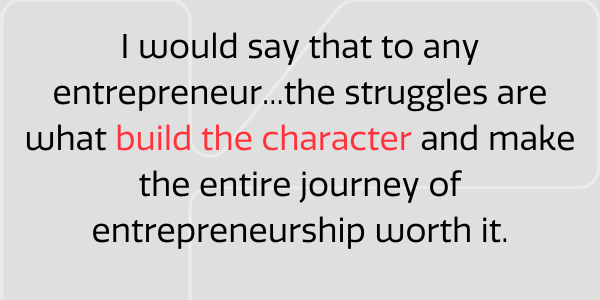
Steve: Awesome. Yeah, that's awesome. I, you know, I would say to myself, 10 years ago, understand what helped you in sport. Isn't necessarily going to be the things, all of the things that are going to help you now and don't get lost in your work and yourself like you did in sport and sport has a finite goal and finite end, which means that your mental health can, can hold on and point to that end point, entrepreneurship doesn't work that way. I would tell myself, you're going to drive your, if you keep doing it the way you're doing, which is what I did, you're going to drive yourself into a hole. And in 2019, I hit a you know, a really deep clinical depression and had to go to counseling and had to take medication. And I'd never experienced that before.
And, you know, ultimately, you know, I would say just, don't try to solve every problem. Not every problem has a solution. If you try to solve the root problem, you're going to fail. And just don't lose yourself in it.
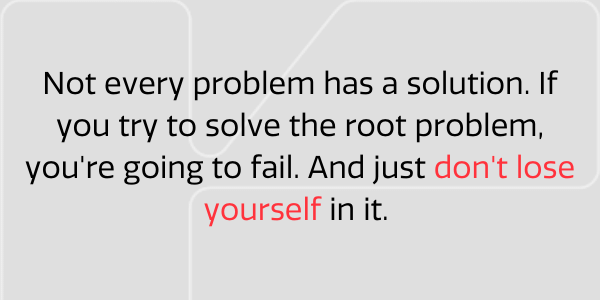
I was on a team where there were 30 guys who wanted my job for 10 years. So you, you don't show vulnerability and holding that together and keeping it together. Maybe as you're in your twenties, you can do it. But it's not a lifelong anti skill that you should, that you should maintain
Josh: Well said. Thank you. Thank you both. I think, you know, one thing that I appreciate about the time that we spent together, not only are you both talented founders, you've built great organizations, but you both are wise.
You have a lot of wisdom that I think it's not just about winning in your business. It's about living a fulfilled life. It's also about being a great son or husband or whatever it might be. And so thank you for bringing that to the table and kind of rounding out our conversation. I think it can be easy to get to these hyper tactical, like, all right, just give me the, give me the playbook. Let me execute and win, but it's like, you can lose everything if you just be hyper-focused on that. So thank you for sharing a little bit about your lives, but also your journey. And we barely scratched the surface. So I hope we can do it again sometime soon.
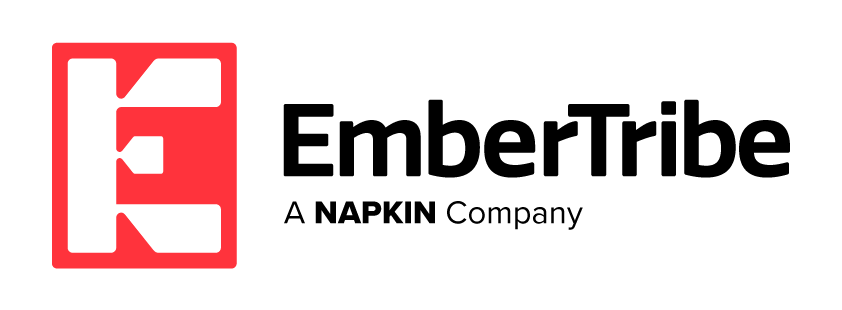

-AK-148968-preview.png?width=842&height=310&name=1.01-1x1px-Embertribe-(Client-Services)-AK-148968-preview.png)








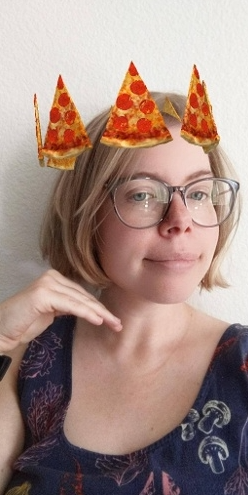










.png?width=810&height=810&name=TJ%20Jones%20-%20%20CoFounder%20EmberTribe%20(1).png)
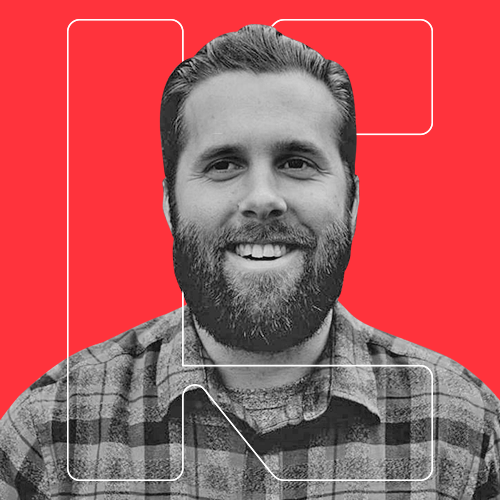
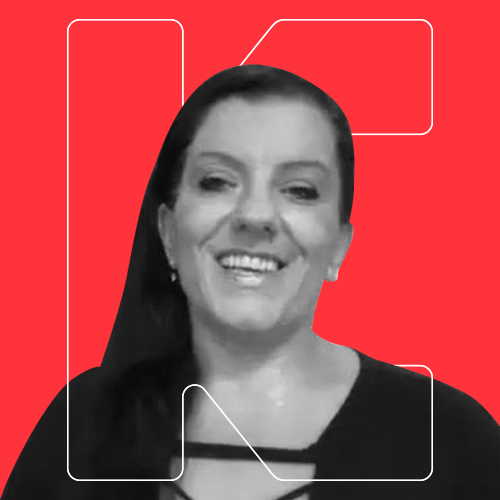
%20-%20500x500%20-%20SP%20-%2045.01.png)
%20-%20500x500%20-%20SP%20-%2049.01.png)
%20-%20500x500%20-%20SP%20-%2057.01.png)

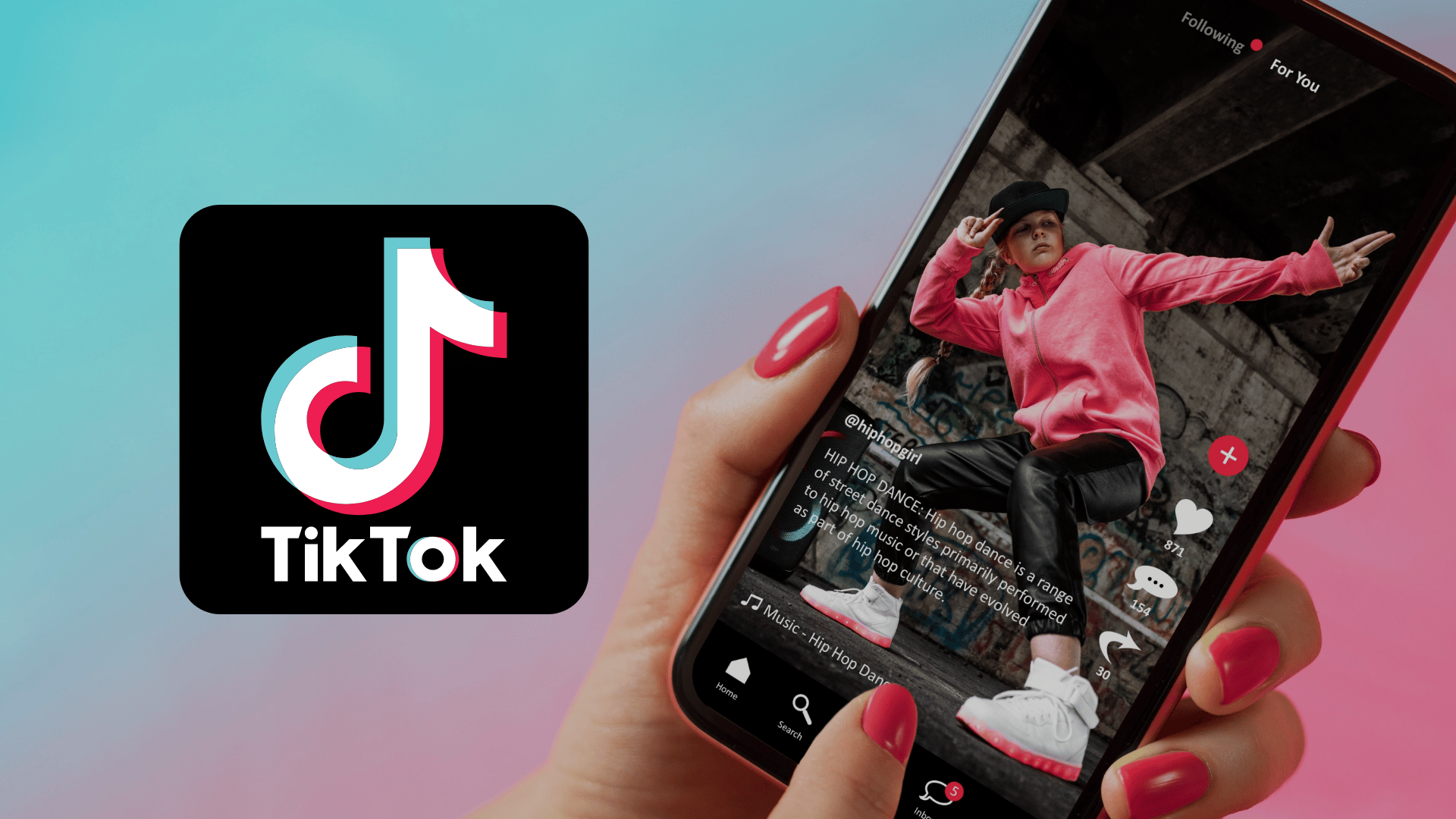
.png)